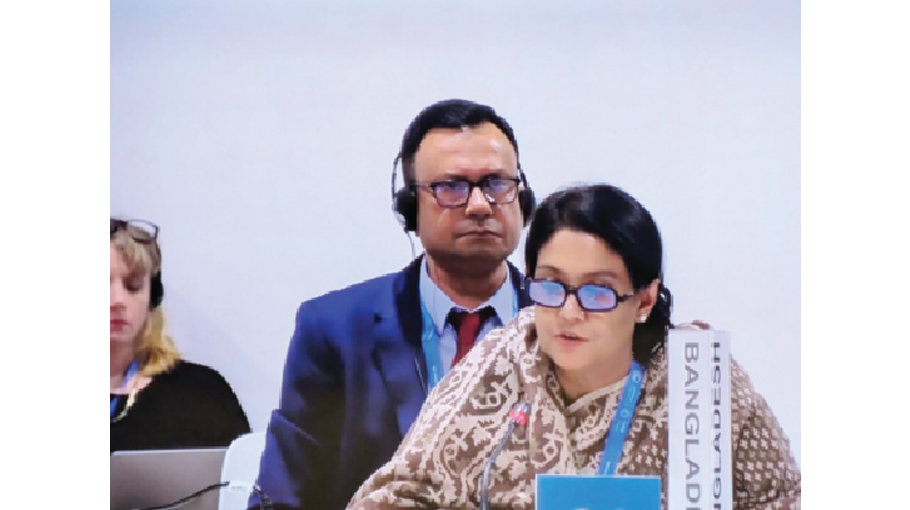Energy transition, adequate climate financing key to Bangladesh’s prosperity

Speakers at a discussion on ‘Pathways to tripling Renewables in South Asia’ during the UN climate conference - Conference of Parties-29 (COP29) in Baku on Azerbaijan on Tuesday said that South Asia, home to 1.93 billion people (27% of the global population), stands at a critical moment in its renewable energy transition. Despite its vast resources, the region’s average per capita electricity consumption is only 656 kWh, which is 74% less than the developing Asia average and 80% below the global average.
To address these disparities and achieve climate goals, South Asia must significantly accelerate its RE transition, said the speakers.
Shakti Foundation, Coastal Livelihood and Environmental Action Network (CLEAN) and Friends of the Earth jointly arranged the discussion where Syeda Rizwana Hasan, adviser to the Ministry of Environment, Forest and Climate Change; spoke as the chief gust.
She said that energy transition and climate financing are the key to sustainable development of Bangladesh. “To increase the renewable energy target, we need the right political vision and effective economic modeling. Otherwise, we will continue making excuses, such as a shortage of land. For instance, 16,000 acres of land were allocated for developing export processing zones (EPZ), while only 10,000 acres would have sufficed for renewable energy needs, she added.
She alleged that the previous government failed to keep up with market dynamics, relying heavily on import-driven energy rather than leveraging domestic resources. It neglected to explore natural opportunities for discovering more gas fields in Bangladesh, conducted no feasibility studies for exploration, and prioritised importing LNG and coal instead. However, under new leadership, there is a shift toward renewables. The government is reconsidering high tariffs on RE imports and inviting foreign entities to establish solar plants in Bangladesh. Air pollution, largely driven by power plants, is a significant environmental concern, making this the ideal time for Bangladesh to invest in renewables’ she added.
Syeda Rizwana Hasan said the Bangladesh government is revising its energy policies to transition from fossil fuel-based energy to renewables.
“High import tariffs are being reconsidered, and foreign investments in solar energy are being encouraged. With air pollution largely driven by power plants, now is the ideal time for Bangladesh to invest in renewable energy,” she said
The Environment Adviser highlighted that the rooftop solar installations could meet up to 40 per cent of the nation's renewable energy needs, while underutilised lands, including tea estates and government-owned barren lands, can be leveraged for renewable energy projects, according to a message received here.
She said that Bangladesh is exploring regional hydropower opportunities from Nepal and Bhutan through India and is keen to establish a regional transmission system to integrate solar and wind energy efficiently.
Earlier in the day, she also spoke at the session titled ‘Bilateral with LDC Ministers on Mitigation’ at the climate conference.
Syeda Rizwana Hasan stressed the urgent need to close the emissions gap within this decade to limit global warming to 1.5 degree Celsius.
“Achieving this target requires a 43 percent reduction in global greenhouse gas emissions by 2030 and 60 percent by 2035 relative to 2019 levels, aiming for net-zero emissions by 2050,” she said.
She also called for enhanced international cooperation and support for implementing conditional Nationally Determined Contributions (NDCs) of Least Developed Countries (LDCs).
The Mitigation Work Programme must facilitate the mobilisation of financial resources and investments to meet these targets, the adviser said.
“Global dialogues must unlock barriers to accessing climate finance. If emissions continue to rise, the cost of adaptation will surpass our capacity to respond,” she warned.
Speaking at the event, Hasan Mehedi from CLEAN, Bangladesh mentioned "South Asia must leverage its vast solar and wind resources through regional cooperation. A regional renewable energy grid could help countries share resources and achieve climate targets collectively."
Imran Ahmed of Shakti Foundation highlighted that "Women are central to future prosperity of Bangladesh. Empowering displaced women through entrepreneurial training has already added 360 MW of clean energy through 6 million solar home systems in Bangladesh. Community engagement will ensure ownership and sustainability."
Vidya Dinker from GrowthWatch, India, called for decentralized energy systems. She stated "India’s push for private-sector nuclear energy overlooks the potential of decentralized renewables to power rural communities. A transition from fossil fuels to renewables is critical for human rights and environmental justice."
Hemantha Withanage of Friends of the Earth Asia Pacific mentioned "Renewable energy projects must consider environmental impacts. For example, wind farms in bird migration routes could harm biodiversity. Sustainable planning is essential to balance development with conservation."
M. Zakir Hossain Khan from Change Initiative mentioned "South Asia has 600 million people without access to energy and receives only 1% of global climate finance, with 60% of it being debt. High-risk nations like Nepal, Bhutan, and Sri Lanka cannot bear such costs. The focus should shift to smaller projects of 50-200 MW and sub-regional grids instead of large-scale initiatives. Transparent, low-cost investments through public-private partnerships are essential. Carbon markets are risky, and new coal plants must stop per the Paris Agreement. Public finance must prioritize community-led systems to ensure resilience without relying solely on insurance."
In conclusion, to accelerate renewable energy adoption, South Asia must establish a clear financing roadmap combining grants, public-private partnerships, and investments. Governments should implement a fossil fuel moratorium while promoting distributed renewable systems, such as rooftop solar to empower communities. Strengthening regional cooperation through sub-regional grids and ensuring access to advanced technologies for rapid deployment are essential steps toward achieving these goals.




